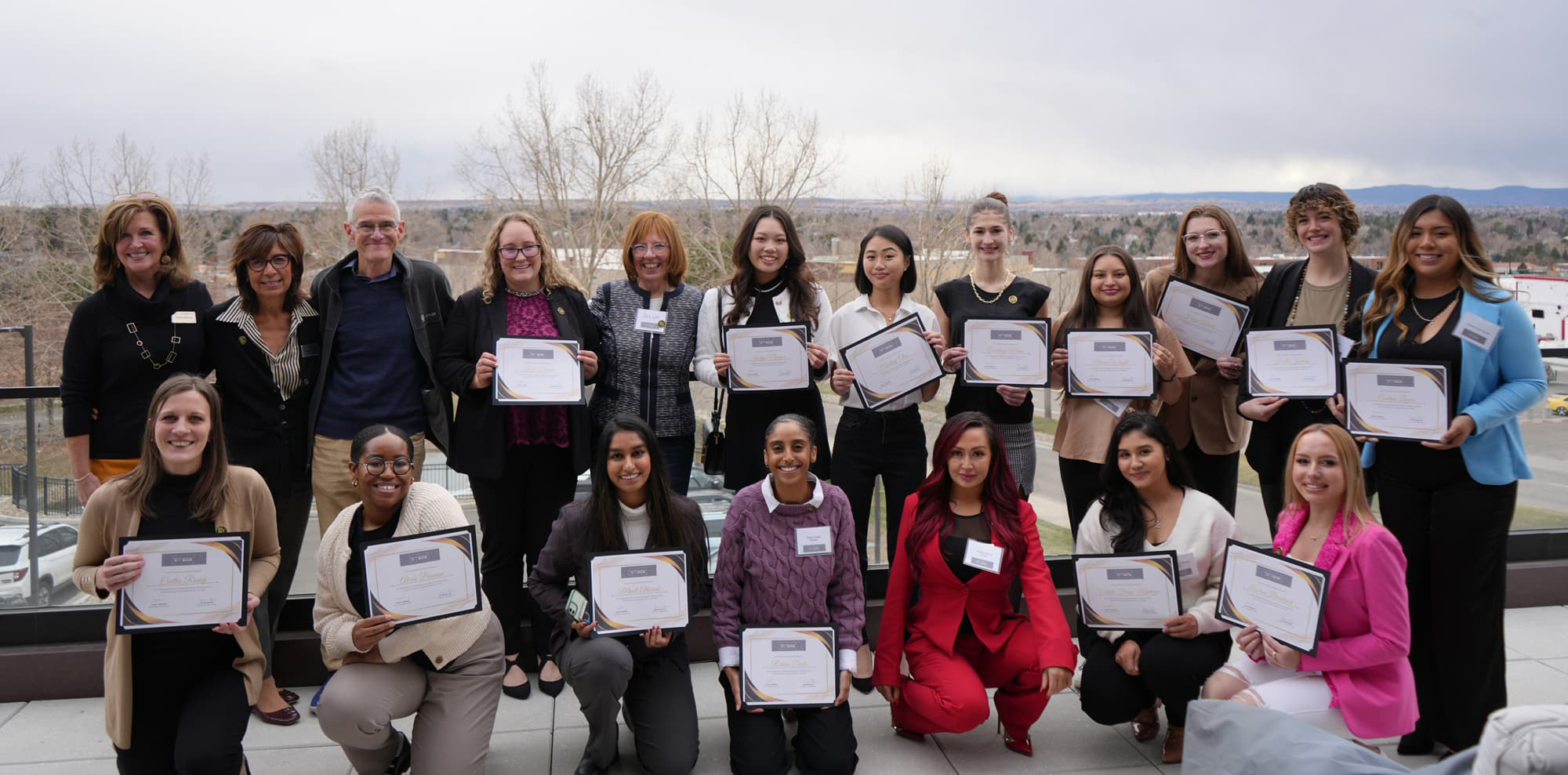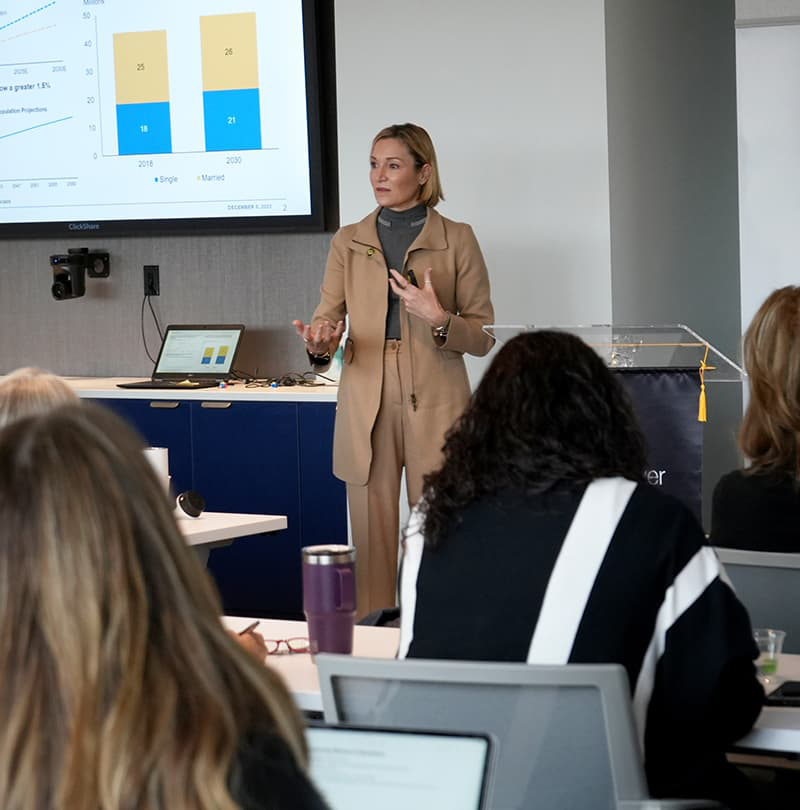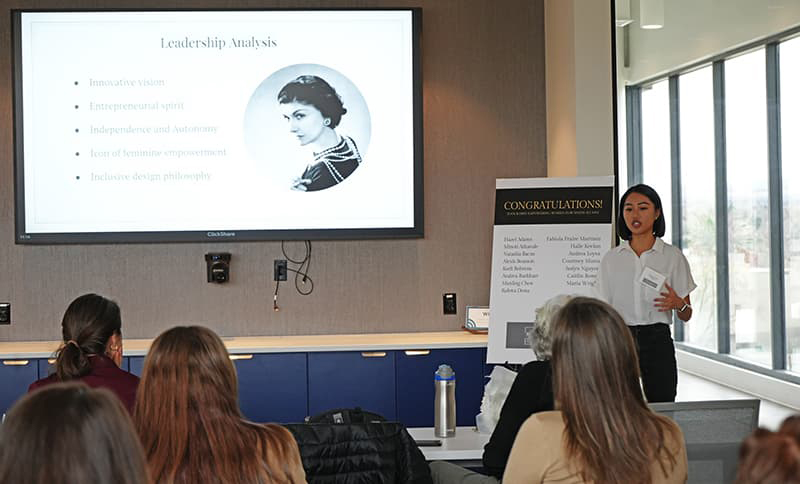Leveling the Playing Field in Corporate America
Successful businesswomen partner with the Business School to help students navigate gender disparities in the workforce.
Jackson Campbell | Office of Advancement Feb 19, 2024
Women account for more than half of the total workforce in the United States, yet they represent a small fraction of corporate leaders. As recently as 2023, women led only 1 in 10 Fortune 500 companies, and those who do rise to the top often have to work harder than their male counterparts to reach the C-suite. In view of this disparity, CU Denver’s Business School introduced Empowering Women in Business (EWiB), a program launched last fall to equip students with the distinct tools they need to navigate the workforce and successfully pursue leadership roles in their careers. Now in its second semester, EWiB thus far has served as an incredible beacon of inspiration that acknowledges often overlooked issues regarding the playing field between men and women in the workplace.
Uniting Around and Supporting a Shared Passion
Developing and launching this program was a collaborative effort between the Business School and several board of advisors members, also successful businesswomen, who helped co-create a vision and inform the curriculum for the program. Several also went a step further and helped bring the program to life through their personal philanthropic support, which includes scholarship support for students wanting to participate but lacking the resources to do so.
“I just sort of felt like I needed to work hard, and that good things would happen,” says Pinnacle Leadership CEO Pattie Money when asked about starting out as a woman in business. “And further along in my career, especially as I was leading people, programs, and organizations, I started realizing that in order for me to get ahead I had to work significantly harder.” While Pattie did find working harder led to great success in her career, she began to see a need for a program focused on navigating the gender inequality she and countless others faced. The challenge was not just to acknowledge the problem, but to find a way to do so while building connections and being productive towards a career goal. She found that her passion was shared by Tribby Warfield, a successful businesswoman who currently sits on the boards of multiple prominent companies, and Malena Brohm, chief of staff of CU Denver’s business school.
“Pattie and I were kind of the co-dreamers with Malena,” says Tribby, who in the early stages of her career had noticed a distinct lack of female mentors and leaders. “We started out with quite a few phone calls where we were just thinking about the what-ifs and how to do it.” This began a working relationship between Pattie, Tribby, and Malena to create a new and applicable program for the school that raises important issues while meeting the needs of the student body. “Malena has worked so hard to make this course come alive, we couldn’t have done it without her,'' says Pattie.
A High-Impact Program Open to All 
The program is multidimensional, making it unique among other courses, and aims to create a memorable experience for the students that will serve them well as they go further into their careers. EWiB is a high-impact program currently embedded as a class taught by Jacyn Meyer, an instructor in the Marketing department. As such, it helps fulfill degree requirements and is open to all students, including those who identify as male, as learning to be allies and advocates is an important component of the program. The program also pairs each student with an experienced senior business mentor from whom they can benefit from personalized lessons about finding success in the field. These mentors, among other participants, join the class throughout the semester as guest speakers, covering topics such as unconscious bias, global business, and navigating career paths.
The program’s first semester wrapped up with an end-of-year symposium where the students each gave prepared presentations on influential women in business as a final project. The symposium brought together classmates and mentors one last time and featured keynote speakers Colorado Secretary of State Jenna Griswold and Morgan Stanley Chief Economist Ellen Zentner (pictured at right). “This program really opens up the eyes of a lot of young women—and hopefully any young males we can get in there—to understand why this is important,” says Tribby, sharing the importance of women and their perspectives in the workplace.
The class so far has received a great deal of praise from the students. Karli Behrens, who took the course in the fall, found that the program boosted her confidence and provided an experience she had never before encountered in a classroom setting. “We were given an opportunity to interact with business leaders on a more personal level and learn their most helpful tips for the business world,” says Karli. “Meeting with these individuals also gave us a chance to practice networking, and I now am connected with several of them on LinkedIn.” Upon completing the course, Karli recalled how far she had come from the beginning of the semester. “I thought back to how shy I was on the first day,” she noted. “For the first time in my entire life, I felt genuinely confident and proud of myself.”

Contributing to a Strategic Imperative
Like most college courses, the EWiB program is one that will develop over time. The program’s second semester iterates on the previous semester to make an even larger impact. “It’s important to see what skills the students are walking away with, so I think the course will always be a work in progress,” says Pattie. One pivotal step for the program has been the doubling of its enrollment for the current semester, demonstrating its popularity and allowing a greater number of students to experience the program.
Even when focusing on the future, the EWiB program has been instrumental in laying the groundwork for a level of impact that will positively benefit the Business School and its students for years to come. Both Pattie Money and Tribby Warfield are enthusiastic about this impact and plan to remain involved. “The work the Business School is doing is so important to a multicultural city and its students, and to preparing the next generation of workers,” says Tribby, referring to her initial interest in working closely with the Business School.
“The Empowering Women in Business program is one of the most important initiatives contributing to the Business School’s strategic imperative focused on inequality,” says Scott Dawson, Dean of the Business school. “Without the inspiration, involvement, and financial contributions of successful executives such as Tribby Warfield and Pattie Money, we simply could not offer this formative experience to our students. Their financial support of the program allows us to provide students with a memorable capstone experience.”